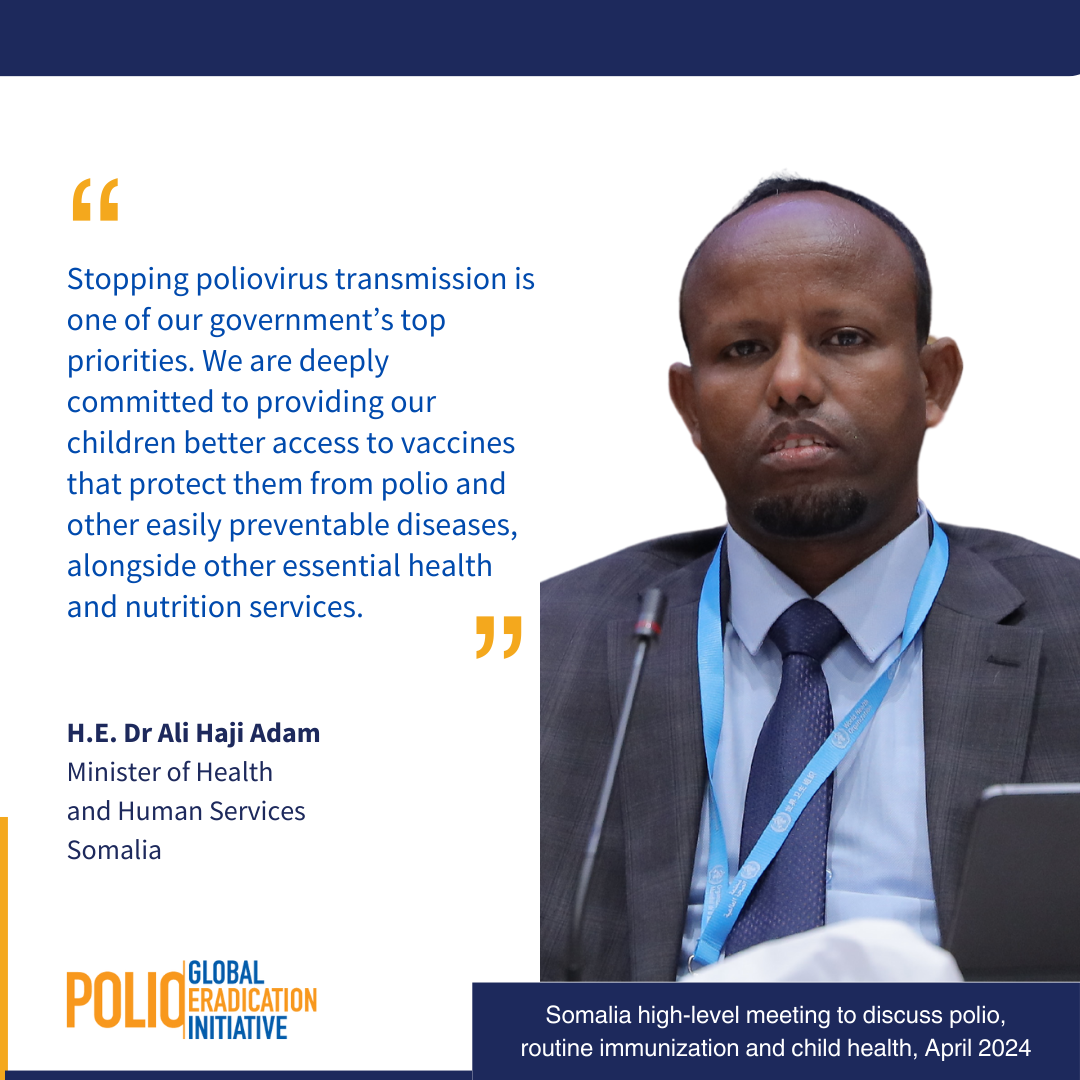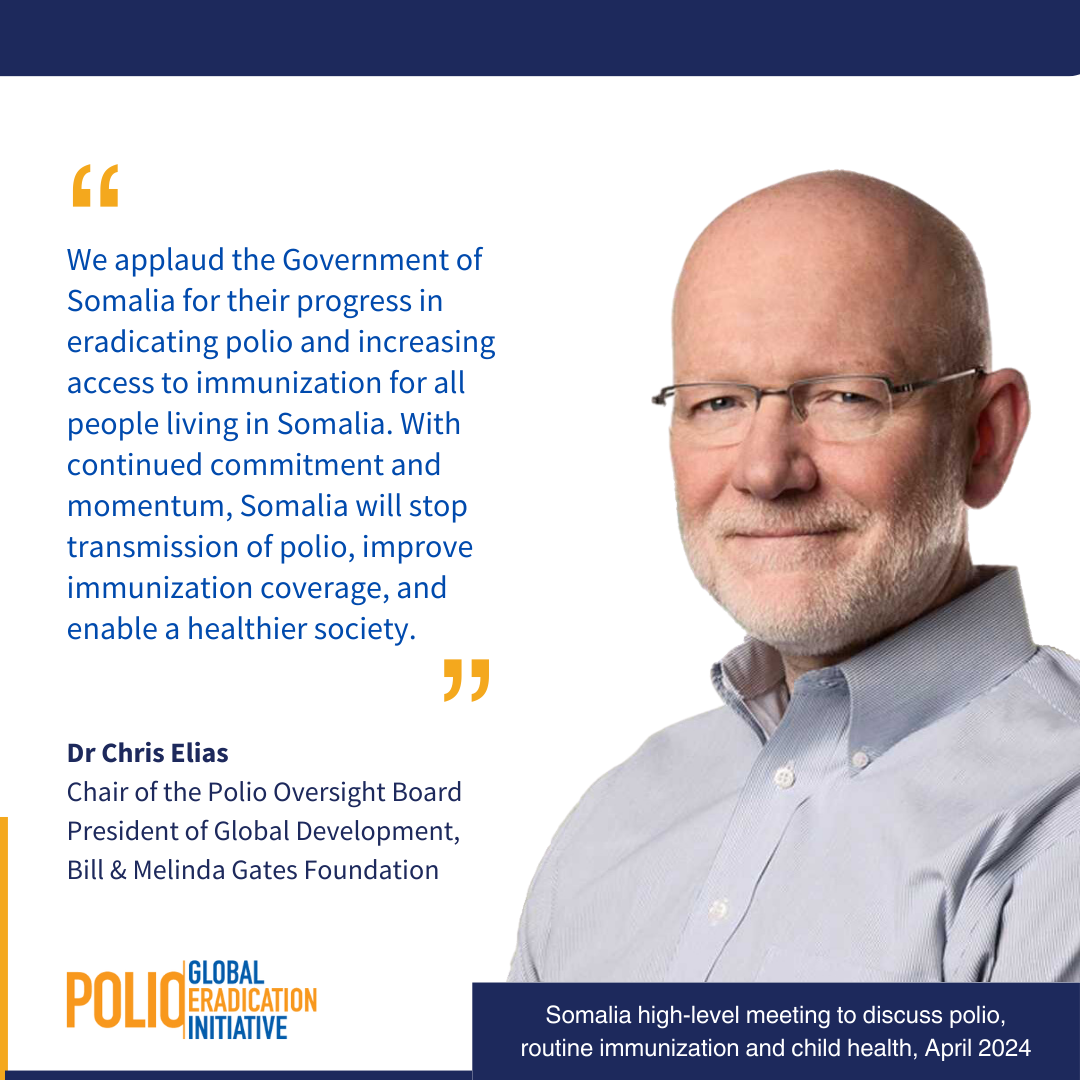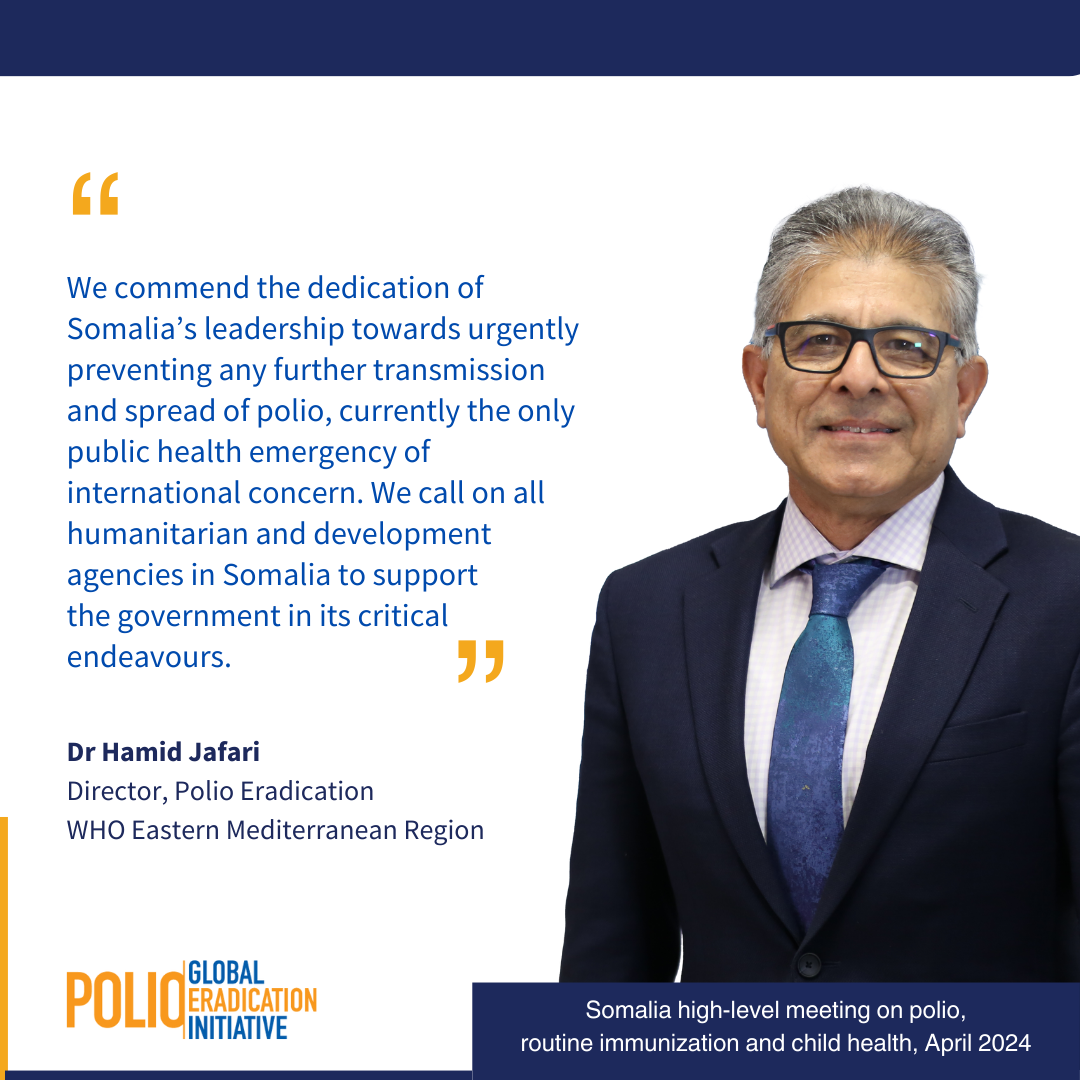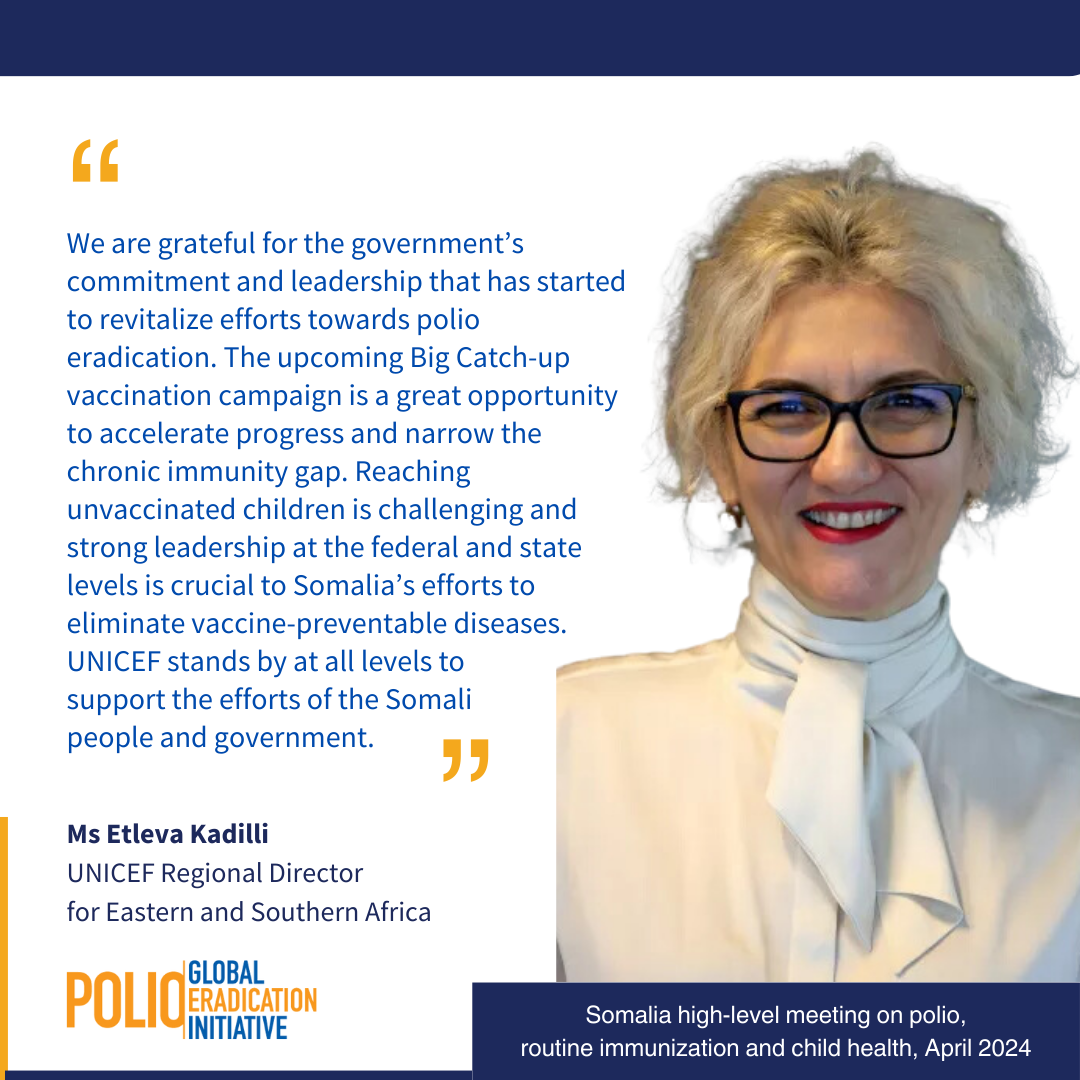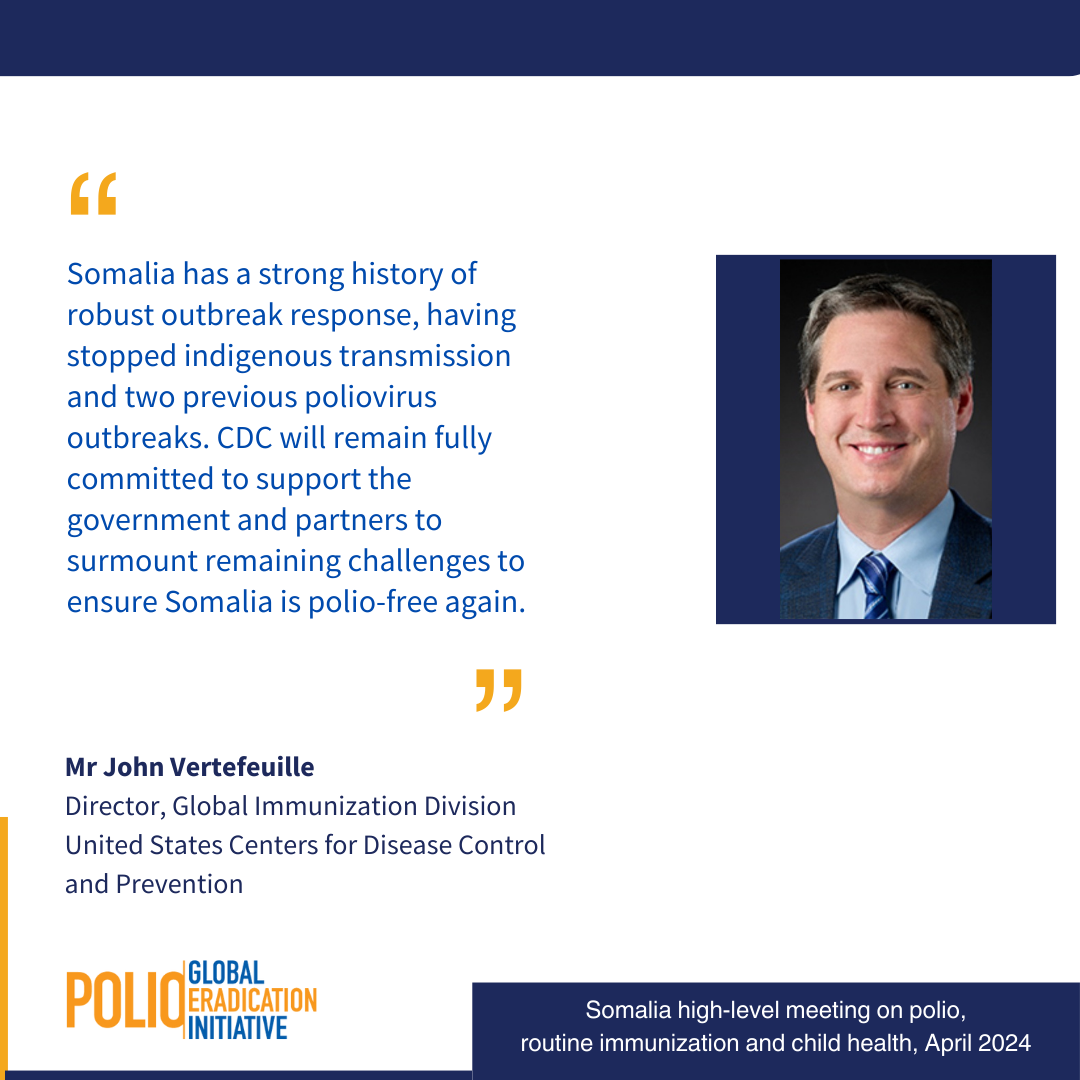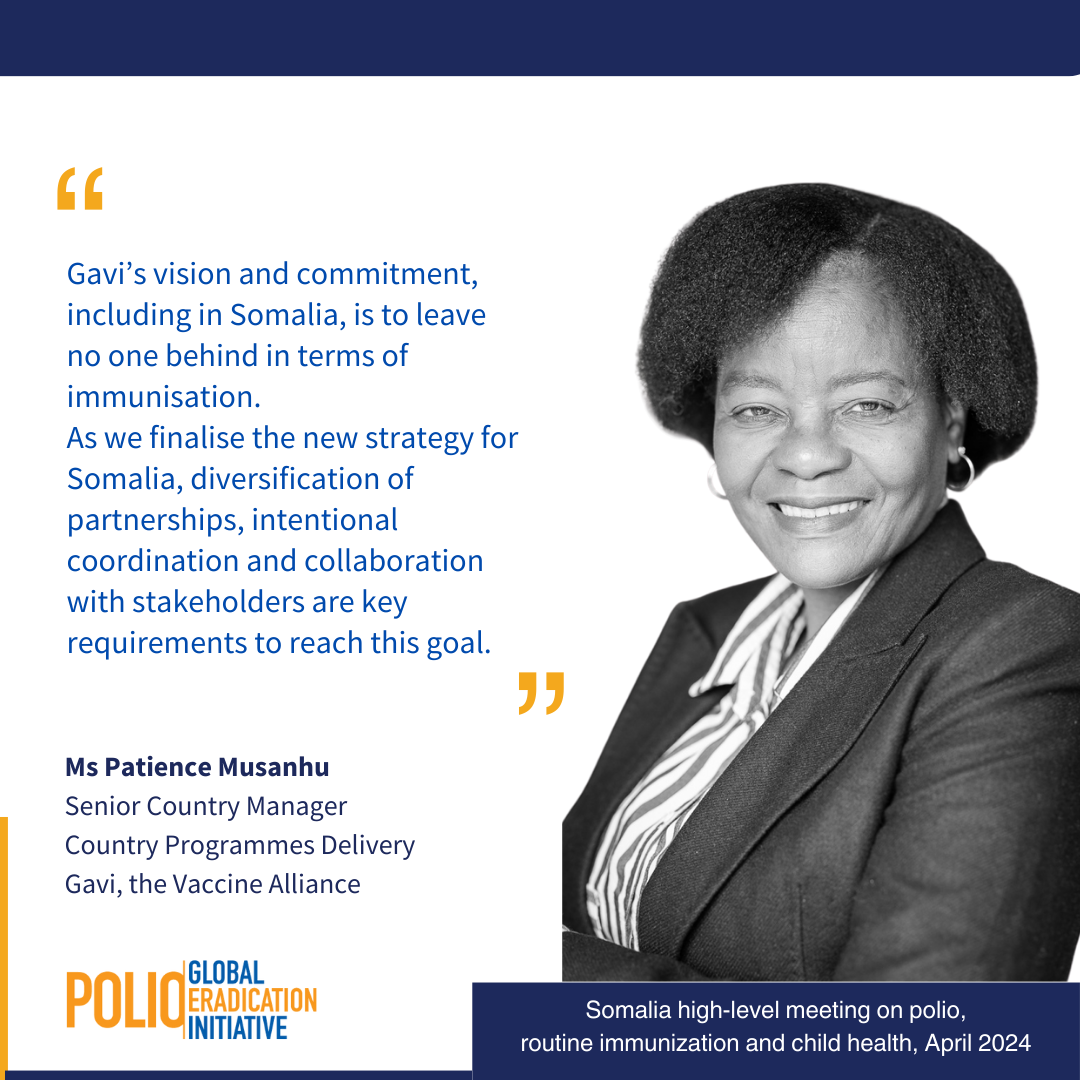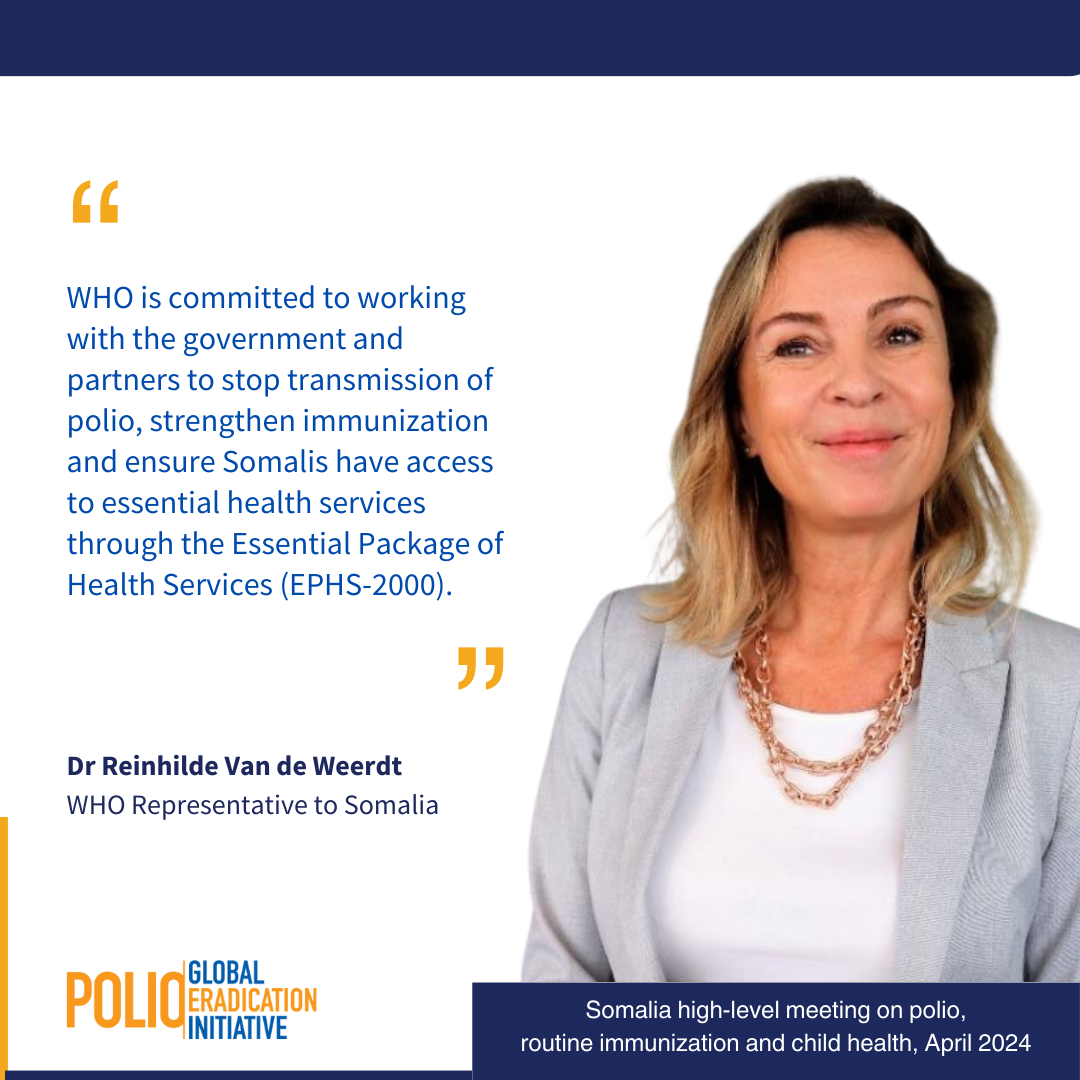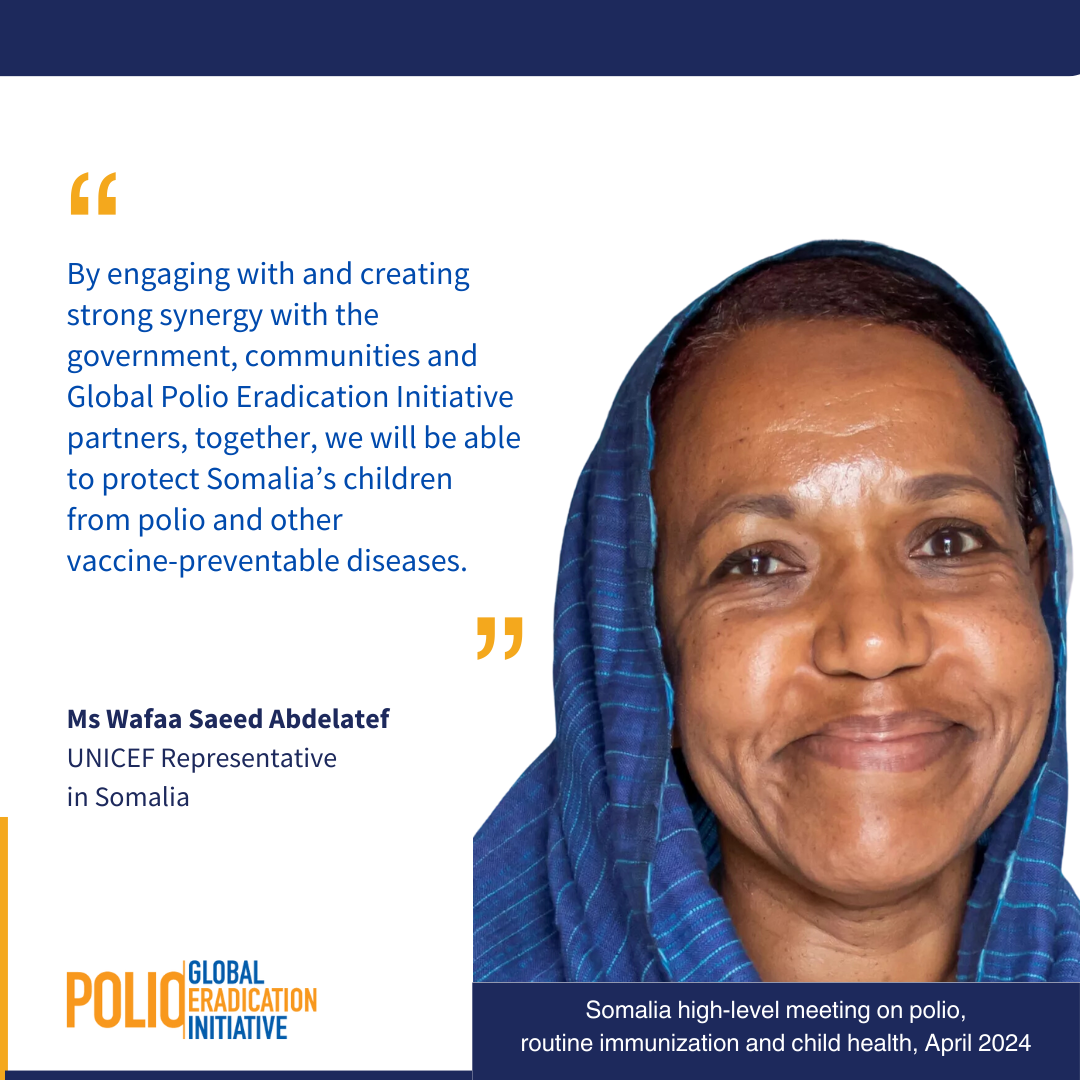Breaking the cycle: addressing recurring cholera outbreaks in Somalia
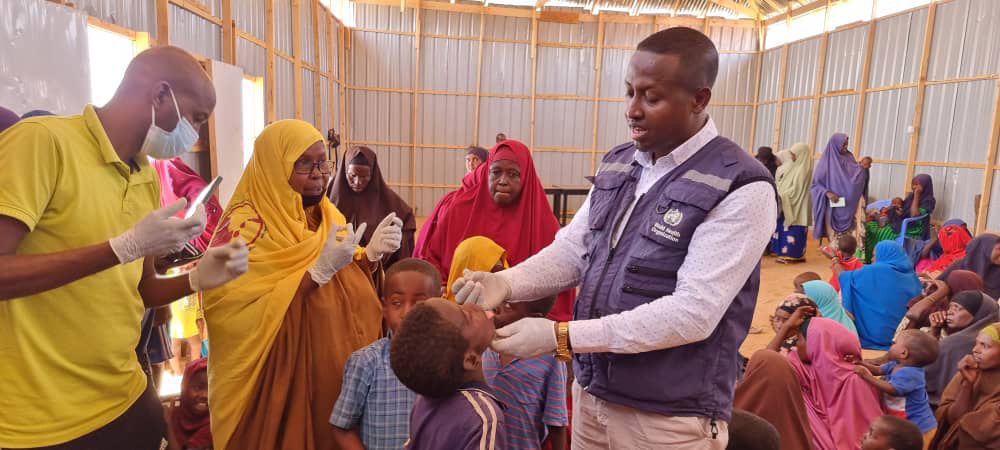
4 November 2024, Mogadishu, Somalia – Since the early 1990s, Somalia has suffered multiple outbreaks of cholera which, due to poor sanitary conditions, have affected a majority of the population living in internally displaced camps.
The latest outbreak occurred early in 2024 in the capital Mogadishu, with the districts of Dayniile, Dharkaynley, Wadajir, Kahda and Hamar Jajab particularly badly affected. In response, the Federal Ministry of Health and Human Services and the Banadir Health Administration, with the support of WHO, UNICEF and other partners, promptly embarked on a door-to-door cholera vaccination campaign targeting the affected districts to prevent the spread of the disease. Staff also conducted awareness-raising activities to educate residents on how to control the spread of cholera.
WHO polio programme assets and expertise were deployed to support the response activities. Hawa Abdullahi Ali, 55-years-old, who has worked on polio campaigns in Kahda since 1998, first as a vaccinator and then in her current position as District Polio Officer, was among the experienced team that WHO relied on to deliver relief to thousands of residents in the high risk district of Kahda in May 2024.
Hawa says the experience underlined the importance of delivering high quality interventions to vulnerable residents.
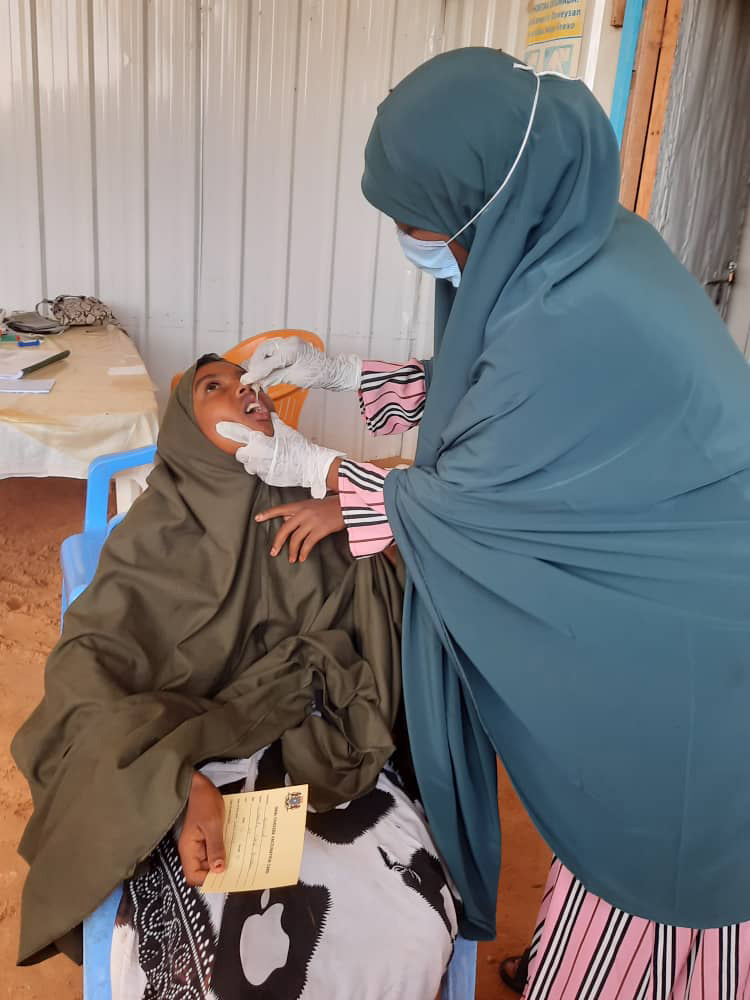 It is not the first time Hawa and her colleagues working in the polio programme have delivered on other public health priorities. They were also responsible for building coordination and strengthening surveillance during the COVID-19 pandemic response.
It is not the first time Hawa and her colleagues working in the polio programme have delivered on other public health priorities. They were also responsible for building coordination and strengthening surveillance during the COVID-19 pandemic response.
"The contribution of the polio workforce in responding to other public health emergencies is critical to the overall service delivered to vulnerable people. Protecting those most at risk, in the communities in the most at-risk areas, is key to reducing infections and saving lives,” says Hawa.
“By rapidly responding to the cholera outbreaks we were able to limit transmission, safeguard communities and prevent our health systems being overwhelmed.”
Through efforts like that of Hawa, the WHO polio programme, with the support of the Government and other partners, successfully vaccinated over 1 244 687 people aged one year and older with the oral cholera vaccine (OCV) across 12 districts in 5 states in May 2024.
“Our dedicated team, which included 244 district field assistants, 12 district polio officers, 10 regional polio officers, 5 state polio officers, state data assistants, national data managers, state SIA coordinators and over 2196 vaccinators and recorders, played a crucial role in this achievement,” said WHO Somalia’s Immunization Coordinator Dr Gedi Mohamed.
Hawa believes her team’s efforts not only protected locals from cholera but also inspired hope among vulnerable families who viewed the health workers as a lifeline during this critical time.
"As a team, we understood that every vaccine we delivered could mean the difference between life and death. The trust we've built within the community empowered us to reach more people than we imagined. It was incredible to see mothers lining up, knowing that together we were safeguarding the future of our children.”
Cholera remains a major public health challenge in Somalia, especially in regions affected by conflict and displacement, and with limited access to clean water and sanitation.
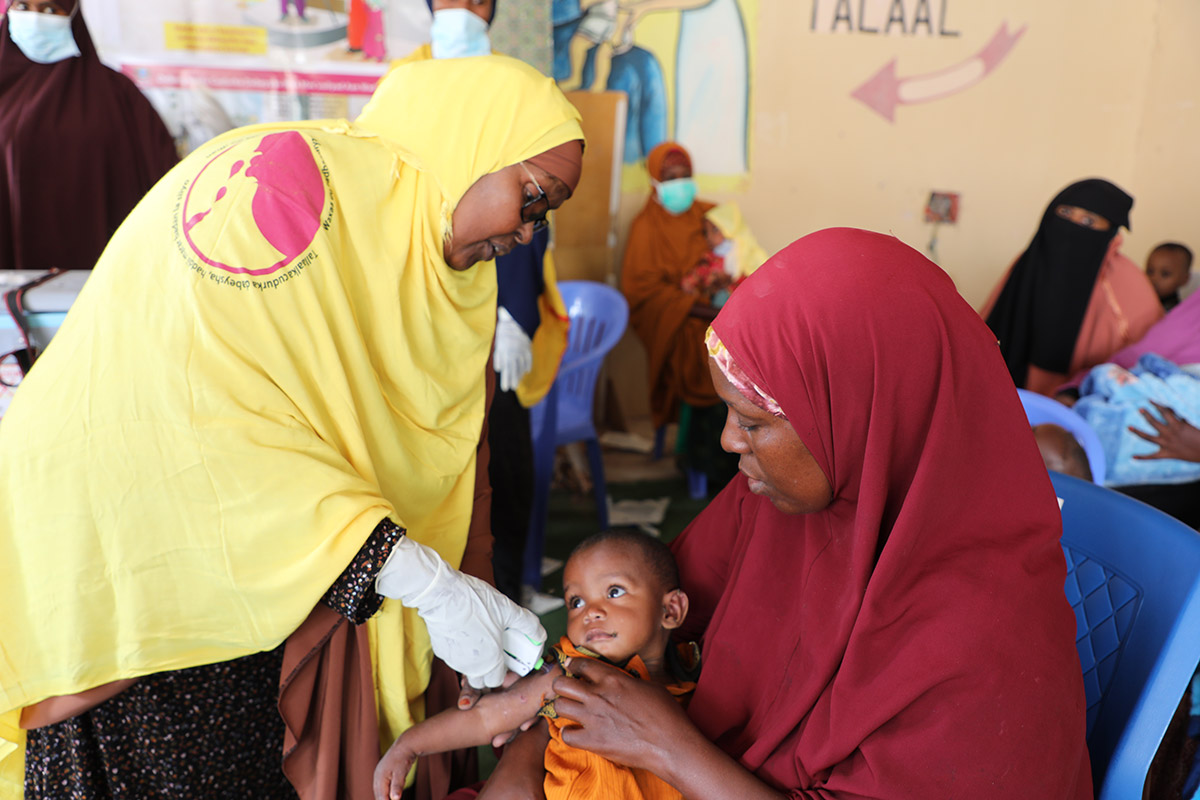 Over the years, cholera outbreaks have claimed many lives and placed immense pressure on Somalia's fragile health care system. Coordinated efforts by the Government of Somalia, WHO and partners have been instrumental in reducing the impact of the disease through rapid response measures, health education and vaccination campaigns.
Over the years, cholera outbreaks have claimed many lives and placed immense pressure on Somalia's fragile health care system. Coordinated efforts by the Government of Somalia, WHO and partners have been instrumental in reducing the impact of the disease through rapid response measures, health education and vaccination campaigns.
In the last four weeks, 768 new cholera cases have been reported from 31 districts, with a rise in cases in the areas of Kismayu, Jowhar, Marka, Burhakab, Barawe, Borama and Baidoa. Of these cases, 399 (52.0%) were female and 407 (53%) were children under 5 years.
To control cholera and prevent future outbreaks, it is crucial that all stakeholders prioritize sustainable access to clean water and improved sanitation and support the widespread delivery of cholera vaccines. Together, these actions can protect vulnerable populations and ensure that life-saving health services reach those most in need.
26 years of building a solid foundation for polio eradication
Polio champion Maryan Jama Du’ale retires after 2.5 decades
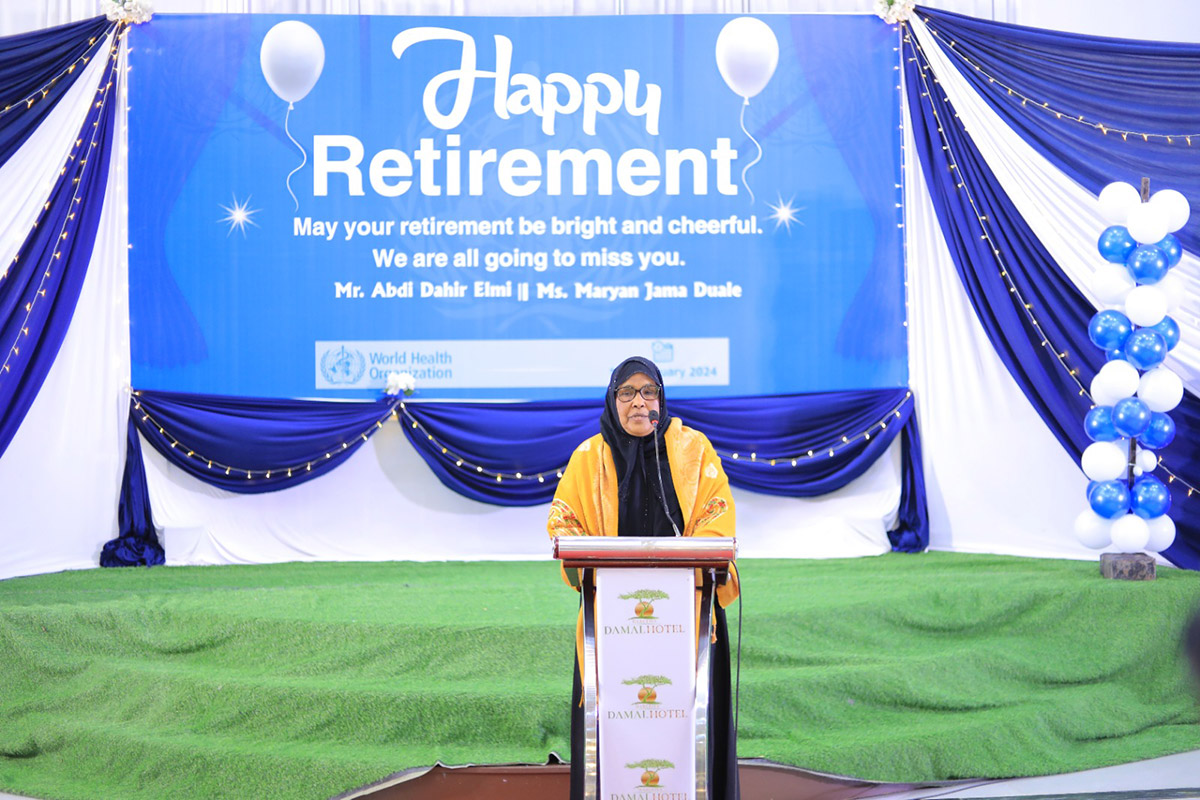 Maryam Jama Du’ale at her retirement farewell ceremony hosted by WHO Somalia in Hargeisa, Somaliland. Photo credit: WHO/WHO Somalia31 July 2024 – In April 1998, certified nurse and public health officer Maryan Jama Du’ale was invited to a workshop to get familiar with a new initiative: the National Polio Eradication Programme. She made an impression at the event, which was hosted by WHO and the health ministry of the self-declared administration of Somaliland. Within a few weeks, Maryan joined the programme as a district polio officer in Hargeisa, Somaliland.
Maryam Jama Du’ale at her retirement farewell ceremony hosted by WHO Somalia in Hargeisa, Somaliland. Photo credit: WHO/WHO Somalia31 July 2024 – In April 1998, certified nurse and public health officer Maryan Jama Du’ale was invited to a workshop to get familiar with a new initiative: the National Polio Eradication Programme. She made an impression at the event, which was hosted by WHO and the health ministry of the self-declared administration of Somaliland. Within a few weeks, Maryan joined the programme as a district polio officer in Hargeisa, Somaliland.
Her role included setting up surveillance sites to search for poliovirus in children aged under 15 years. She was also tasked with supporting the implementation of polio vaccination campaigns in Somaliland and supervising her teams to quickly address any setbacks.
When Maryan began her work, Somalia was engulfed in a civil war, its health infrastructure was in ruins and vaccine-preventable diseases, such as polio, were rampant. Back then, many people in the country did not know that polio existed – even though Somalia confirmed 12 wild poliovirus (WPV) cases in 1998.
Like many other communities around the world, many people in Somalia were afraid of vaccination. Limited awareness of polio-related activities also meant that some were initially sceptical about the need to collect stool samples from children presenting with acute flaccid paralysis (AFP), a common symptom of poliomyelitis.
“Community members thought vaccination would stop childbirth or that it was against our religion,” explains Maryan. “It took us a lot of time and effort to help people to understand that polio vaccines are safe and rigorously tested before use. Vaccine acceptance is much better now, although we face other challenges, such as complexities in reaching children in insecure areas. However, most people now understand that we collect stool samples from children with AFP to test for poliovirus.”
Inspired by a child to eradicate polio
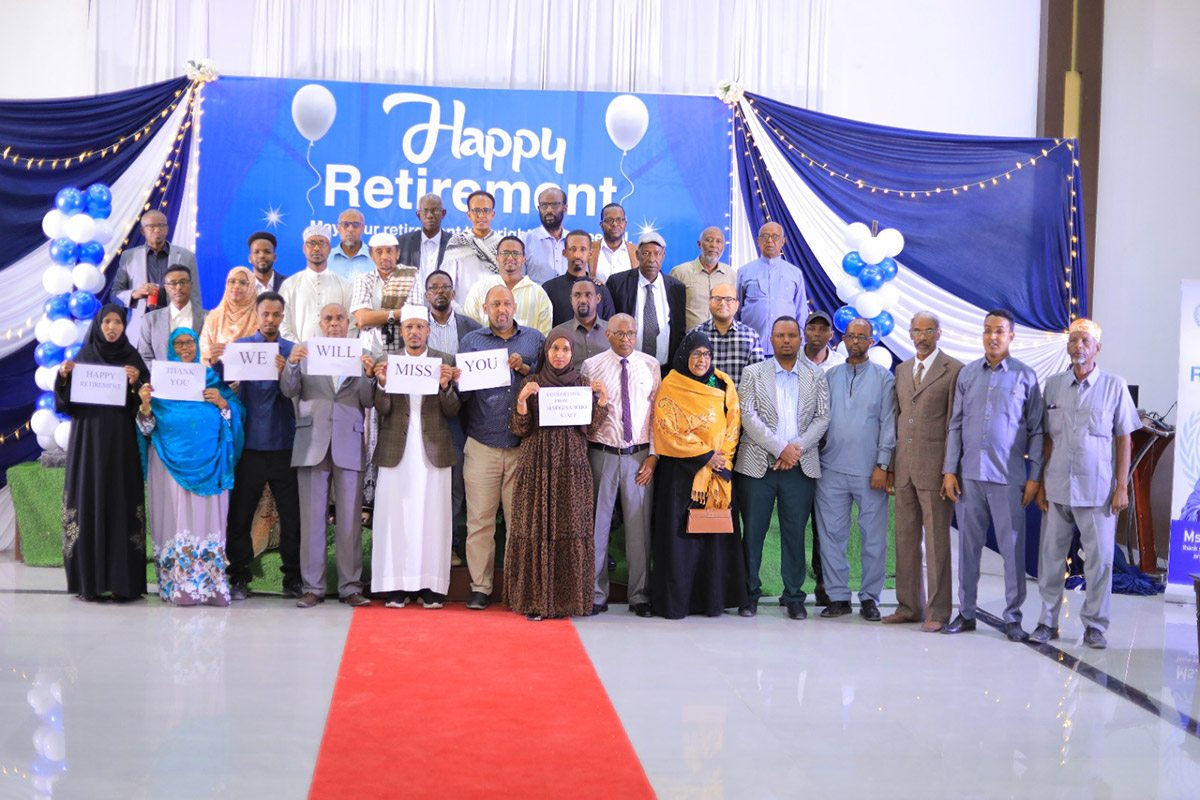 Group photo taken with retiree Maryan Jama Du’ale at her farewell ceremony. Photo credit: WHO/WHO SomaliaEarly on in her work, Maryan met a child who had been paralysed by WPV in the village of Qool-buulale, on the Somalia–Ethiopia border. It was a meeting that shaped the rest of her career.
Group photo taken with retiree Maryan Jama Du’ale at her farewell ceremony. Photo credit: WHO/WHO SomaliaEarly on in her work, Maryan met a child who had been paralysed by WPV in the village of Qool-buulale, on the Somalia–Ethiopia border. It was a meeting that shaped the rest of her career.
“That first encounter with a child paralysed by polio moved me. It made me understand the importance and impact of our work. I saw first-hand how our work could prevent further spread of polioviruses and protect children from lifelong paralysis,” she says.
The available health facilities, which were inadequate and far apart, could not address emerging cases and the need to provide vaccines.
“When we heard about polio cases, we often had to use donkey carts or camels to transport vaccines to reach remote villages or mountains. When a case was reported near the border, we would cross all kinds of terrain to reach children,” adds Maryan.
Over her career, Maryan and her teams helped ensure children received polio vaccinations and other health services. They did this with the help of dedicated medical doctors and trained health volunteers, and through social mobilization and outreach campaigns, among other strategies, backed by partners.
Owing to these immense efforts, the National Polio Eradication Programme made significant progress. Four years after the immunization programme was established, Somalia interrupted transmission of WPV, in 1998. Later, Somalia confirmed and closed a couple of imported WPV1 outbreaks, from 2005 to 2007 and from 2013 to 2014.
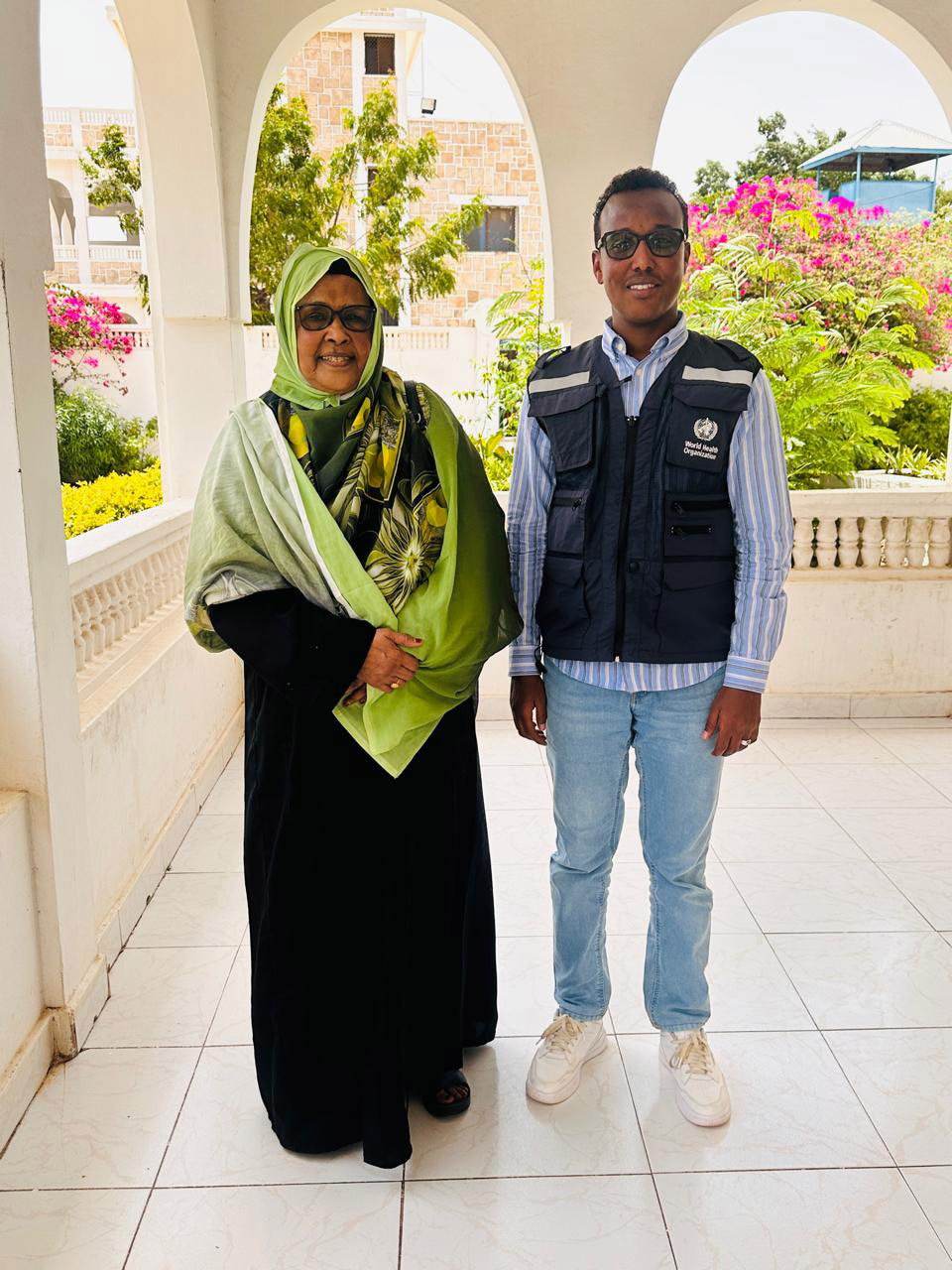 WHO Somalia Communication Officer Khadar Hared is pictured with Maryan Jama Du’ale after interviewing the polio champion about her experiences in Hargeisa. Photo credit: WHO/WHO SomaliaThe last time Maryan saw a child with WPV in Somaliland was in 2017 in Burco, Togdheer. In October 2017, however, Somalia confirmed an outbreak of variant poliovirus, which occurs in places where children have low immunity. Although Somalia has closed WPV and variant polio outbreaks before, the variant poliovirus that was detected in 2017 is still smouldering in the country. Maryan firmly believes Somalia will end this outbreak soon too.
WHO Somalia Communication Officer Khadar Hared is pictured with Maryan Jama Du’ale after interviewing the polio champion about her experiences in Hargeisa. Photo credit: WHO/WHO SomaliaThe last time Maryan saw a child with WPV in Somaliland was in 2017 in Burco, Togdheer. In October 2017, however, Somalia confirmed an outbreak of variant poliovirus, which occurs in places where children have low immunity. Although Somalia has closed WPV and variant polio outbreaks before, the variant poliovirus that was detected in 2017 is still smouldering in the country. Maryan firmly believes Somalia will end this outbreak soon too.
“Witnessing that our collective efforts, alongside the government and partners, had contributed to stopping poliovirus spread, time and again, continuously filled me with immense pride and happiness,” adds Maryan.
Passing on the baton after 26 years of service
Gradually, by earning communities’ trust and working to expand the programme over the years, Maryan rose through the ranks to become a state polio eradication officer. In this role, she managed eradication efforts across Somaliland. She retired in January 2024, after 26 years of exemplary service.
Maryan’s story reveals the power of resilience and the unwavering commitment of the health workforce to end polio in Somalia, even amid great adversity.
USAID supports set up of subnational Health Cluster structure in Somalia, boosting localization
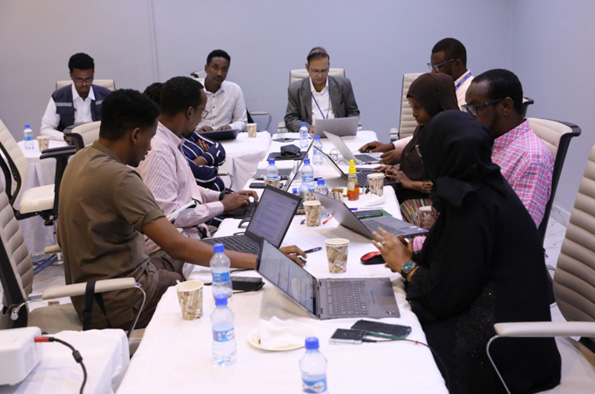 Dr Uday Raj Naidu Canchi Bhoopal (pictured in the middle), a WHO subnational Health Cluster coordinator, joins the Health Cluster strategic advisory group in a humanitarian fund allocation review exercise for partners in Jubaland. Photo credit: WHO/WHO Somalia3 July 2024, Mogadishu, Somalia – Ms Fatima Abdirazak Ahmed joined WHO in Somalia at the beginning of 2024 as a subnational Health Cluster coordinator in Hirshabelle state. Having just finished a meeting with 15 Health Cluster partners, she heads to the office of Hirshabelle State Ministry of Health. Here, she will brief and discuss with the Director-General the ongoing efforts of the Health Cluster to reach vulnerable and underserved communities with health services during the measles and cholera outbreaks across the state. Health Cluster partners thus play a crucial role in the collection and reporting of disease surveillance data.
Dr Uday Raj Naidu Canchi Bhoopal (pictured in the middle), a WHO subnational Health Cluster coordinator, joins the Health Cluster strategic advisory group in a humanitarian fund allocation review exercise for partners in Jubaland. Photo credit: WHO/WHO Somalia3 July 2024, Mogadishu, Somalia – Ms Fatima Abdirazak Ahmed joined WHO in Somalia at the beginning of 2024 as a subnational Health Cluster coordinator in Hirshabelle state. Having just finished a meeting with 15 Health Cluster partners, she heads to the office of Hirshabelle State Ministry of Health. Here, she will brief and discuss with the Director-General the ongoing efforts of the Health Cluster to reach vulnerable and underserved communities with health services during the measles and cholera outbreaks across the state. Health Cluster partners thus play a crucial role in the collection and reporting of disease surveillance data.
Dr Uday Raj Naidu Canchi Bhoopal is a subnational Health Cluster coordinator based in Kismayo, Jubaland. He leads regular Health Cluster meetings to coordinate partners’ actions on humanitarian response, from provision of supplies to service delivery, particularly for measles and cholera outbreak response. He also coordinates critical training for Health Cluster partners. Recently, he facilitated training for 12 health professionals, from various health facilities, on clinical management of severe acute malnutrition with medical complications, and cholera case management. The latter gave health workers the knowledge and practical skills to manage cholera cases appropriately and promote infection prevention and control in cholera treatment units in line with globally recognized practices and protocols.
Along with Fatima and Naidu, 5 more state-level Health Cluster coordinators are deployed across Somalia to ensure subnational coordination among partners and with state ministries of health. These subnational Health Cluster coordinators play a pivotal role in emergency response – for example, understanding demand and coordinating the provision of essential supplies – and in health system strengthening. For instance, they promote the use of the Somalia Essential Package of Health Services (EPHS) as a harmonized standard for health service delivery and outbreak response efforts.
Importantly, the Health Cluster coordinators also work with the other clusters, including the Food Security, Nutrition, WASH (Water, Sanitation and Hygiene) and Protection clusters. This coordination enables integrated responses to people in need of humanitarian assistance.
In Somalia, the Health Cluster comprises 81 partners: 28 international non-governmental organizations (NGOs), 42 national NGOs, 4 United Nations agencies, 3 donors, 3 observers and a single national authority. It is co-led by WHO and Save the Children.
Initially, only the national-level Health Cluster Coordination structure was in place. WHO was able to recruit 7 subnational Health Cluster coordinators (4 international and 3 national staff) thanks to funding support from the United States Agency for International Development (USAID) Bureau for Humanitarian Assistance (BHA). Having a well-functioning subnational Health Cluster structure supports operational coordination much closer to the affected population and better adapted to its specific needs, enabling true localization.
Since the subnational Health Cluster coordinators were deployed, the regular Health Cluster coordination meetings have fostered stronger coordination and collaboration among health actors. The impact of the new coordinators’ efforts was showcased at a recent meeting of the Somalia Health Partner Group (SHPG). At the meeting, Erna van Goor, National Health Cluster Coordinator, based in Mogadishu, presented to the donors and partners illustrative maps produced and monitored by the Health Cluster. These maps show the locations and functionality of health facilities and current availability of health services across the country. This presentation vividly demonstrated the complexities and triumphs of the work of the Health Cluster and its coordinators, which was highly valued by humanitarian and development actors for their essential role in preventing duplication of efforts, monitoring service availability and quality, and addressing the health needs of the most vulnerable populations.
For more information, please contact
Erna van Goor, National Health Cluster Coordinator, WHO Somalia
Email:
Madinur Saydahmat, Partnerships Officer, WHO Somalia
Email:
Prime Minister launches Somalia Immunization and Polio Eradication Task Force, calling for swifter action to end vaccine-preventable disease outbreaks
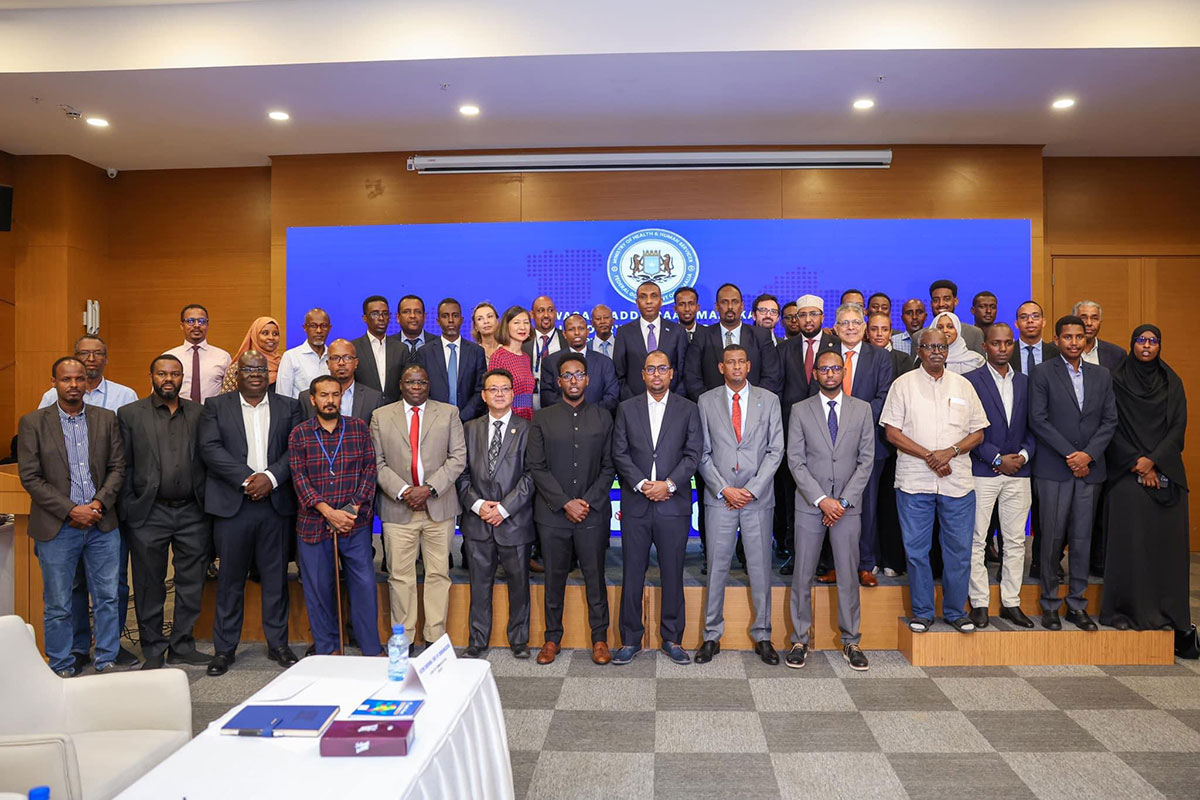 1 July 2024, Mogadishu, Somalia – In a landmark step to accelerate progress towards accelerating immunization coverage and ending polio in Somalia, the Prime Minister of Somalia, His Excellency Mr Hamza Abdi Barre, launched a national task force on immunization and polio and a related forum on 29 June 2024.
1 July 2024, Mogadishu, Somalia – In a landmark step to accelerate progress towards accelerating immunization coverage and ending polio in Somalia, the Prime Minister of Somalia, His Excellency Mr Hamza Abdi Barre, launched a national task force on immunization and polio and a related forum on 29 June 2024.
The Somalia Immunization and Polio Eradication Task Force (SIPE), which the Prime Minister himself will chair, will oversee and coordinate polio eradication and immunization efforts across the country. It will mobilize financial and technical resources and ensure that every child in Somalia is reached with life-saving vaccines. SIPE comprises key health officials at federal and state levels and international partners.
Speaking at the launch in Mogadishu, Prime Minister Barre reiterated his government’s commitment to stop the transmission of polio by providing strong support and oversight of polio eradication and routine immunization activities in Somalia.
“The establishment of the national task force on immunization and polio is a testament to my government’s commitment to this cause,” he said. “We commit to mobilize support for the implementation of the Somalia Emergency Action Plan, including working closely with the Federal Member States of Somalia and neighbouring countries to stop cross-border transmission.”
SIPE signifies Somalia’s commitment at a very high political level to stop polio – which has been circulating uninterrupted in the country for 7 years – and immunize children against vaccine-preventable diseases.
South-central Somalia is one of 7 areas identified by the Global Polio Eradication Initiative as consequential geographies. Such areas are prone to repeated polio outbreaks, which are hard to control because of overpopulation, fragile health systems and conflict. The other 6 areas are eastern Afghanistan; southern Khyber Pakhtunkhwa, Pakistan; Tete province and its hinterland in northern Mozambique; eastern Democratic Republic of the Congo; northern Yemen; and northern Nigeria. Outbreaks in these areas may be exported to other countries.
Since 2021, Somalia has confirmed 16 cases of polio, all in the south-central region. An estimated 1.5 million children have never been vaccinated and Somalia is one of 5 countries globally with an under-five mortality rate greater than 100 deaths per 1000 live births. Without intensified efforts, Somalia is unlikely to meet its 2030 Sustainable Development Goal target of no more than 25 deaths per 1000 live births.
The Prime Minister also launched the Child Survival Forum, which will review progress and devise strategies and an action plan to further reduce child mortality.
“I am proud to say that the Government of Somalia, along with our partners, has taken several steps to address these challenges, including initiatives such as Damal Caafimaad and Better Lives, to ensure universal health coverage for all,” said Minister of Health Dr Ali Hajji Aadam Abubakar. “I call upon all to support integrated service delivery, especially for children.”
“Immunization is a cornerstone of our public health strategy and has proven to be one of the most effective ways to protect our children from preventable diseases,” said Dr Abdirashid Mohamed Nur Jiley , Special Envoy of the President of Somalia on Health and Nutrition. “We have numerous challenges in Somalia but our commitment to immunization remains strong. Let us continue with renewed determination, knowing our efforts will yield a legacy for generations to come.”
Speaking virtually, Dr Hanan Balkhy, WHO Regional Director for the Eastern Mediterranean, appreciated the honourable Prime Minister and Minister of Health’s commitment to address the pressing health challenges facing children in Somalia. “This high-level forum will be instrumental in addressing the protection of more than 1.5 million zero-dose children, who have never received a dose of life-saving vaccines, and help in bringing the longest-running outbreak of variant poliovirus to an end,” she said.
With 77 000 children in Somalia dying every year before their fifth birthday, and Somalia in urgent need of accelerated progress to reduce these deaths, the government has stepped up the much-needed leadership. Later in 2024, Somalia will introduce the pneumococcal and rotavirus vaccines to prevent deaths caused by pneumonia and diarrhoea, both leading causes of child mortality.
At the global level, a resolution initiated by Somalia calling for accelerated action to end maternal and child mortality around the globe was adopted at the Seventy-seventh World Health Assembly. This places Somalia among countries leading the way in tackling maternal and child mortality.
“The Global Polio Eradication Initiative is grateful for Somalia’s leadership and strong commitment to their children,” said Mr Andrew Stein, Deputy Director, Polio, Bill & Melinda Gates Foundation. “Through the government’s leadership, in partnership with nongovernmental organizations, work to stop polio and increase access to immunization is more robust than ever. I am confident that Somalia will prevent thousands of cases of polio, measles, pneumonia and vaccine-preventable diseases.”
At the heart of intensified efforts is immunization, which alone can prevent two thirds of child deaths. Yet, current immunization services in Somalia fall short of the scale and consistency required to make a positive impact on mortality. A recent assessment of health facilities found that immunization services are available in only 56% of public hospitals, 68% of health centres and 19% of primary health care units.
“For Somalia to attain progress, immunization services need to be provided more widely and consistently in as many health facilities as possible,” said acting United Nations Children’s Fund (UNICEF) Representative in Somalia Mr Charles Lolika. “We believe that with Somalia’s resilience and determination, supported by partners and strategies and guidelines to enhance maternal and child health, rapid progress is possible.”
The challenges facing Somalia are well documented. Decades of conflict have complicated service delivery, and climate-induced shocks such as droughts and floods have displaced millions of people, who now live in overcrowded areas with limited access to services. The country’s health system remains fragile, with inadequate human resources and a limited network of cold chain facilities for delivery of vaccines, especially in remote and hard-to-reach areas.
Notes to editors
Download media content on the launch of the task force and forum.
For more information, contact:
Mohamed Osman, Head of Communication and Public Engagement, Federal Ministry of Health
Email:
Victor Chinyama, Chief of Communication, UNICEF Somalia
Email:
Fouzia Bano, Communications Officer, WHO Somalia
Email:
Somalia marks World Immunization Week with a call to accelerate efforts to reach every child with essential, life-saving immunizations
29 April 2024, Mogadishu, Somalia – While marking World Immunization Week this year, Somalia’s Federal Ministry of Health, the World Health Organization (WHO) and the United Nations Children’s Fund (UNICEF) have jointly urged partners and donors to accelerate immunization efforts to reach every child in Somalia.
This year’s World Immunization Week coincides with the 50th anniversary of the global Essential Programme on Immunization and aims to spur greater engagement around immunization, to reiterate the importance of vaccination and improve the health and well-being of every child, everywhere. This year’s commemoration highlighted the successes of immunization in Somalia since 1978 and the challenges that require a concerted effort – the uninterrupted, 7-year circulation of the polio variant; the large number of children who have never been vaccinated (zero-dose children); the recurrent outbreaks of vaccine-preventable diseases like measles, diphtheria and whooping cough; and the need for an expanded resource envelope to tackle these challenges.
 Minister of Health Dr Ali Hajiadam Abubakar poses for a group photo with health partners to kick-start World Immunization Week 2024 in Mogadishu, Somalia. Photo credit: UNICEF/MaslahSpeaking at a press conference in Mogadishu on Sunday, Federal Minister of Health for Somalia Dr Ali Hajiadam Abubakar said that despite Somalia having had the best-performing immunization programmes in the Eastern Mediterranean Region historically, prolonged conflict and instability in the last few decades have resulted in a weakened, fragmented and severely underfunded health system.
Minister of Health Dr Ali Hajiadam Abubakar poses for a group photo with health partners to kick-start World Immunization Week 2024 in Mogadishu, Somalia. Photo credit: UNICEF/MaslahSpeaking at a press conference in Mogadishu on Sunday, Federal Minister of Health for Somalia Dr Ali Hajiadam Abubakar said that despite Somalia having had the best-performing immunization programmes in the Eastern Mediterranean Region historically, prolonged conflict and instability in the last few decades have resulted in a weakened, fragmented and severely underfunded health system.
“This year’s theme – Humanly Possible – serves as a powerful reminder of our collective responsibility to ensure that every child in Somalia has access to life-saving vaccines. The introduction of new vaccines such as the pneumococcal conjugate vaccine and rotavirus vaccine later this year will further help us to combat pneumonia and diarrhoea, 2 diseases that contribute greatly to child mortality in Somalia,” he said.
“The coverage in Somalia is still insufficient to effectively combat vaccine-preventable diseases, and consequently we have experienced various outbreaks,” said Ms. Patience Musanhu, Senior Country Manager for Gavi, the Vaccine Alliance. “I wish to reiterate Gavi’s commitment to continue its investment in vaccines and immunization to ensure equitable vaccination coverage across the country. I strongly urge all stakeholders to redouble their efforts to increase vaccination coverage to safeguard children against vaccine-preventable diseases.”
“Vaccines are one of the greatest success stories of public health. And yet, despite all the knowledge and resources available globally, children in Somalia continue to contract vaccine-preventable diseases. For example, in first quarter of 2024, 382 people have been confirmed for measles, 75% of which are children under 5 years of age in Somalia,” said Dr Reinhilde Van De Weerdt, WHO Representative to Somalia. “Greater efforts are needed, with an integrated approach to tackle the systemic challenges the country is facing by its health system, that affect the delivery of essential health services and hinder progress in Somalia’s commitment toward universal health coverage.”
Globally, immunization programmes have been the bedrock of primary health services in communities and countries due to their reach and coverage. A major landmark study released this week reveals that global immunization efforts have saved an estimated 154 million lives – or the equivalent of 6 lives every minute of every year – over the past 50 years. The vast majority of people saved – 101 million – were infants.
The study, led by WHO and to be published in The Lancet, shows that immunization is the single greatest contribution of any health intervention to ensuring babies not only see their first birthdays but also continue to lead healthy lives into adulthood.
“In Somalia, the threat from vaccine-preventable diseases remains alarmingly high, with an estimated 1.5 million children under 5 known as ‘zero-dose’ children. These children are the most vulnerable, having never received any vaccines, and are disproportionately affected by diseases such as measles, diphtheria and whooping cough,” said UNICEF Representative to Somalia Ms Wafaa Saeed. “Let us all commit, as leaders, health professionals and global citizens, to safeguard the future of our children by ensuring that every child in Somalia receives their right to immunization. Let’s make this humanly possible.”
Some of the challenges Somalia faces in ensuring all communities have access to vaccinations include a fragile health system, further impeded by conflict and natural disasters; limited access to cold chain facilities in remote areas and among hard-to-reach populations; and difficulty in reaching people living in insecure and inaccessible locations.
“The high number of unimmunized and underimmunized children in Somalia who live in contexts such as IDP [internally displaced person] camps, urban poor settings and hard-to-reach areas increases risks of vaccine-preventable disease outbreaks. For the past 5 years, we have been grappling to respond to at least 2 outbreaks each year, as evident from the national surveillance reports,” said Save the Children Acting Country Director Dr Binyam Gebru. “While we stand here today in solidarity to mark this World Immunization Week, let’s reaffirm our commitment to ensure every child in Somalia gets immunized, which is a basic human right, and I believe with concerted efforts, this is humanly possible."
Over the years, WHO, UNICEF and partners have extended support to Somalia to develop systems to store different vaccines, establish systems to vaccinate children, and to compile and store data around immunization for decision-makers to use. Despite all the challenges, Somalia has had some success in getting more children vaccinated using strategies such as mobile outreach facilities in addition to fixed vaccination sites. Additionally, teams of health workers and social mobilizers, supported by the government, WHO and UNICEF, are regularly visiting communities to share messages on the benefits of vaccination.
Yet the country needs more support to protect children, particularly vulnerable ones, from vaccine-preventable diseases such as measles, cholera, polio, diphtheria, tuberculosis, pertussis and tetanus.
For additional information, please contact:
Mohamed Osman, Head of Communication and Public Engagement, Federal Ministry of Health
Email:
Victor Chinyama, Chief of Communication, UNICEF Somalia
Email:
Fouzia Bano, Communications Officer, WHO Somalia
Email:
Somalia’s tangible progress on malaria, even in the face of new strains
 A team engages in insecticide residual spraying as a core interruption measure in response to the malaria outbreak in Burtinle, in Puntland, Somalia. Photo credit: WHO Somalia/A. Mukhtar25 April 2024, Mogadishu, Somalia – Somalia managed to reduce the prevalence rate of malaria from 20.1% in 2015 to 4.1% in 2023 in the most affected areas by adopting an integrated disease response. The Federal Ministry of Health in Somalia led this work, with technical support from WHO and the United Nations Children’s Fund (UNICEF) and financial support from the Global Fund.
A team engages in insecticide residual spraying as a core interruption measure in response to the malaria outbreak in Burtinle, in Puntland, Somalia. Photo credit: WHO Somalia/A. Mukhtar25 April 2024, Mogadishu, Somalia – Somalia managed to reduce the prevalence rate of malaria from 20.1% in 2015 to 4.1% in 2023 in the most affected areas by adopting an integrated disease response. The Federal Ministry of Health in Somalia led this work, with technical support from WHO and the United Nations Children’s Fund (UNICEF) and financial support from the Global Fund.
Applying prevention, interruption and supplementary measures, Somalia’s malaria programme reduced disease incidence to as low as 3.4% in 2022, as documented by the country’s National Malaria Control Programme. The slight increase in incidence in 2023, to 4%, was due to the impact of drought and floods in the country.
Marking World Malaria Day 2024, Dr Sagal Roble of the Federal Ministry of Health thanked the partners and donors for helping Somalia to achieve this tangible progress. She also urged the continued support of the partners to address the new strains of malaria emerging in the country and to sustain gains made in the fight against malaria across Somalia. Such an approach supports this year’s World Malaria Day theme of “Accelerating the fight against malaria for a more equitable world”.
During 2023, Somalia increasingly detected a new strain of the parasite Plasmodium falciparum, which is hard to detect with the usual rapid diagnostic test, as well as a new urban invasive vector for malaria, the mosquito Anopheles stephensi, in several districts.
A prolonged drought affected Somalia from 2022 to 2023, and the country has since been hit by heavy rainfalls due to the El Niño phenomenon. Such rapid changes to climate, including temperature, rainfall patterns and humidity, could easily lead to further geographic expansion of malaria transmission or new variation.
Somalia also has a large number of people on the move: nomadic communities, internally displaced people, and people entering from the neighbouring countries of Djibouti, Ethiopia, Kenya and Yemen. This tends to increase the disease prevalence, including malaria, owing to contributing factors such as overcrowded environments, limited access to health care, and lack of awareness.
Dr Jamal Amran, WHO Somalia’s focal person for malaria control, highlighted: “Detection of new malaria strains, compounded by persistent insecurity and health impacts of climate change, may exacerbate the malaria situation in the country.”
Malaria directly endangers health and costs lives. The disease also continues the vicious cycle of inequity, as it disproportionately affects the most vulnerable groups, including pregnant women, children aged under 5 years, refugees, migrants and internally displaced people.
The WHO Country Office in Somalia, in partnership with UNICEF, continues to support the Federal Ministry of Health to implement Somalia’s National Malaria Strategic Plan 2021–2026.
For more information, please contact:
Fouzia Bano, Communications Officer, WHO Somalia
Email:
Saeed Ahmed, Donor Reporting Officer, WHO Somalia
Email:
Related links
King Salman Relief helps equip 28 health facilities with medical oxygen to address killer diseases among children
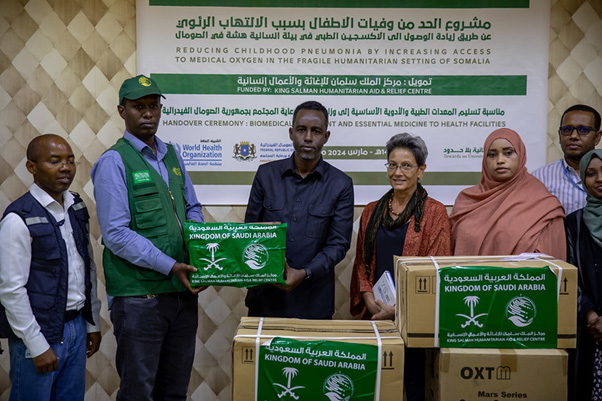 The Ministry of Health of Somalia receives medical equipment and supplies for 28 health facilities in Mogadishu. Photo credit: WHO Somalia/I. Taxta18 April 2024, Mogadishu, Somalia – Biomedical equipment and essential medicines are to reach 28 health facilities across Somalia thanks to the “Every Breath Counts” project, funded by the King Salman Humanitarian Aid and Relief Centre (KS Relief). The Federal Ministry of Health kicked off the distribution of the supplies in collaboration with the WHO Country Office in Somalia.
The Ministry of Health of Somalia receives medical equipment and supplies for 28 health facilities in Mogadishu. Photo credit: WHO Somalia/I. Taxta18 April 2024, Mogadishu, Somalia – Biomedical equipment and essential medicines are to reach 28 health facilities across Somalia thanks to the “Every Breath Counts” project, funded by the King Salman Humanitarian Aid and Relief Centre (KS Relief). The Federal Ministry of Health kicked off the distribution of the supplies in collaboration with the WHO Country Office in Somalia.
The project supports quality emergency care of severe cases of pneumonia and diarrhoea for children. A child born in Somalia today is almost 20 times more likely to die by the age of 5 years than a child born elsewhere due to childhood diseases. Therefore, “Every Breath Counts” aims to reduce childhood pneumonia- and diarrhoea-related morbidity and mortality in Somalia.
Under the KS Relief-funded project, WHO Somalia supports the state-level of health ministries with the provision of life-saving health interventions in primary health centres and referral hospitals. This is done in line with WHO guidelines for the integrated management of newborn and childhood illnesses. Support provided for the health facilities includes the establishment of triage protocols and oral rehydration treatment corners, and provision of medical oxygen and essential medicines.
Dr Guled Abdi Jalil Ali, Director-General of the Federal Ministry of Health of Somalia, officiated the handover ceremony of medical equipment and supplies. Representatives from the KS Relief country team, the Ministry and WHO Somalia were present.
Speaking in appreciation of WHO Somalia’s technical support and the financial support of KS Relief, Dr Guled said: “Considering that child mortality from all causes in Somalia remains the highest in the world, this project is a critical contribution to help improve the coverage and quality of care for our children, with a focus on the main killer diseases, and to build health care capacities.”
Following the recipient of the equipment and medical supplies, the state-level health ministries, with support from WHO Somalia, will deliver equipment and supplies to the targeted facilities to improve the quality of care. In addition, supplies, such as vitamin A, folic acid, albendazole (deworming tablets), zinc and oral rehydration solution, will be distributed at the community level through community health workers to strengthen the delivery of health services.
Mr Mohamed Omar Hassan, Media Officer at KS Relief country team in Somalia, thanked the Federal Ministry of Health and WHO Somalia for their hard work in implementing the project and for their ongoing and successful partnership.
For more information, please contact:
Fouzia Bano, Communications Officer, WHO Somalia
Email:
Saeed Ahmed, Donor Reporting Officer, WHO Somalia
Email:
For more details about WHO’s response across Somalia, see:
Every Breath Counts: increasing access to medical oxygen in Somalia
Somalia’s health minister and partners plan to intensify efforts to end 7-year variant poliovirus outbreak
Partners commit to take bold steps to boost routine immunization and child health in Somalia
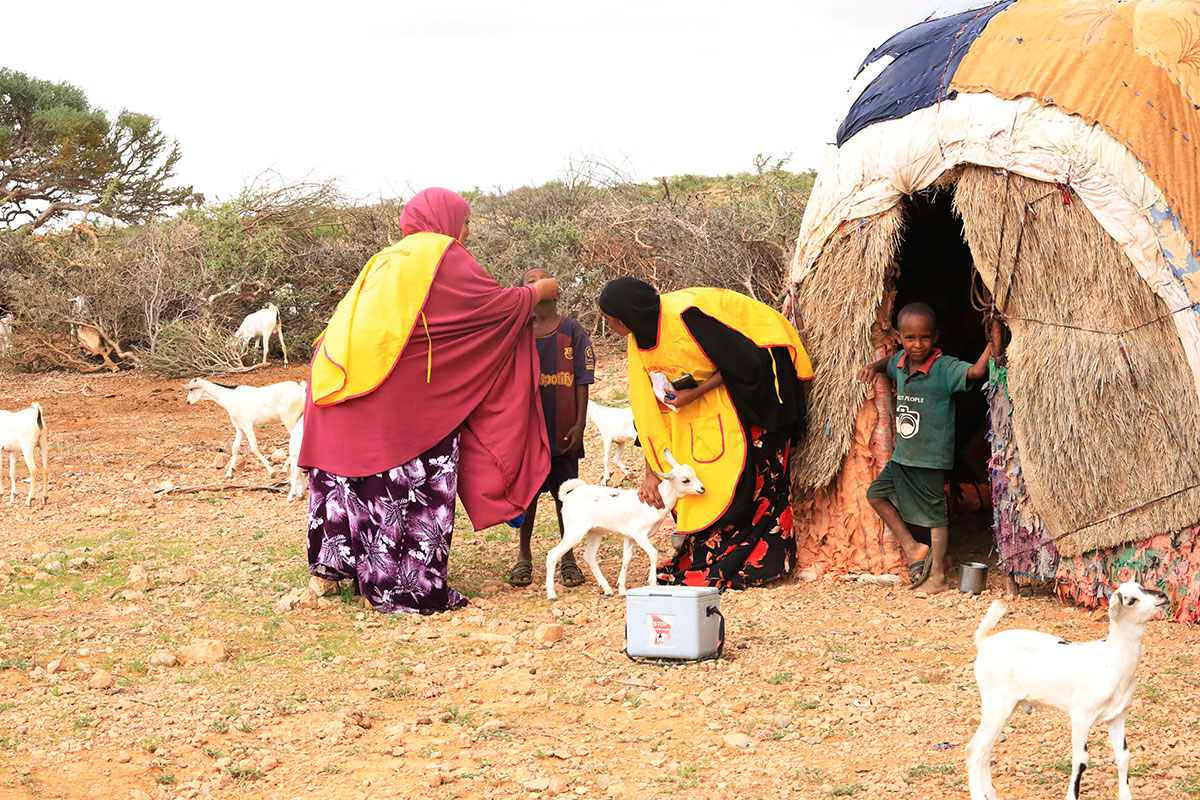 A health worker vaccinates a child from a nomadic family, Puntland. WHO/WHO Somalia16 April 2024, Mogadishu, Somalia – Somalia’s Minister of Health and Human Services His Excellency Dr Ali Haji Adam and high-level representatives of the Global Polio Eradication Initiative met virtually yesterday to review progress and further scale up efforts to end the country’s 7-year variant poliovirus outbreak.
A health worker vaccinates a child from a nomadic family, Puntland. WHO/WHO Somalia16 April 2024, Mogadishu, Somalia – Somalia’s Minister of Health and Human Services His Excellency Dr Ali Haji Adam and high-level representatives of the Global Polio Eradication Initiative met virtually yesterday to review progress and further scale up efforts to end the country’s 7-year variant poliovirus outbreak.
H.E. Dr Adam presented the Somalia Emergency Action Plan (SEAP) 3, which builds on measures taken so far and will fill existing gaps in polio eradication efforts. The plan prioritizes robust, high-quality polio vaccination campaigns and better poliovirus surveillance. Efforts will also be targeted at high-risk populations in hard-to-reach areas and where variant poliovirus is circulating, as well as underserved, displaced and nomadic communities.
The Minister also shared updates on the planned Big Catch-up campaign, which aims to accelerate vaccination of zero-dose children – who have received no vaccines – and capitalize on integration with other health and nutrition services.
Meeting delegates included Dr Chris Elias, Chair of the Polio Oversight Board and President of Global Development, Bill & Melinda Gates Foundation; Mr John Vertefeuille, Director, Global Immunization Division, United States Centers for Disease Control and Prevention; Ms Patience Musanhu, Senior Country Manager, Country Programmes Delivery at Gavi, the Vaccine Alliance; Ms Etleva Kadilli, United Nations Children’s Fund (UNICEF) Regional Director for Eastern and Southern Africa; and Dr Hamid Jafari, Director, Polio Eradication, World Health Organization (WHO) Eastern Mediterranean Region. Ms Wafaa Saeed Abdelatef, UNICEF Representative in Somalia, and Dr Reinhilde Van de Weerdt, WHO Representative to Somalia, also joined the meeting.
“Stopping poliovirus transmission is one of our government’s top priorities,” said H.E. Dr Ali Haji Adam, Minister of Health and Human Services for Somalia. “We are deeply committed to providing our children better access to vaccines that protect them from polio and other easily preventable diseases, alongside other essential health and nutrition services.”
The ongoing variant poliovirus outbreak, the longest running of its kind, has so far paralysed 38 children in Somalia. Through SEAP 3, Somalia will continue to work with humanitarian partners to reach about 1.5 million zero-dose children, most of whom live in the country’s highly populated central and southern areas.
“We applaud the Government of Somalia for their progress in eradicating polio and increasing access to immunization for all people living in Somalia. With continued commitment and momentum, Somalia will stop transmission of polio, improve immunization coverage, and enable a healthier society,” said Dr Chris Elias, Chair of the Polio Oversight Board and President of Global Development, Bill & Melinda Gates Foundation.
Somalia is seen as one of the world’s 6 most critical locations for polio transmission, known as consequential geographies, owing to the high risk of poliovirus spread to other countries.
“We commend the dedication of Somalia’s leadership towards urgently preventing any further transmission and spread of polio, currently the only public health emergency of international concern,” said Dr Hamid Jafari, Director, Polio Eradication, WHO Eastern Mediterranean Region. “We call on all humanitarian and development agencies in Somalia to support the government in its critical endeavours.”
“We are grateful for the government’s commitment and leadership that has started to revitalize efforts towards polio eradication,” said Ms Etleva Kadilli, UNICEF Regional Director for Eastern and Southern Africa. “The upcoming Big Catch-up vaccination campaign is a great opportunity to accelerate progress and narrow the chronic immunity gap. Reaching unvaccinated children is challenging and strong leadership at the federal and state levels is crucial to Somalia’s efforts to eliminate vaccine-preventable diseases. UNICEF stands by at all levels to support the efforts of the Somali people and government.”
Somalia is also currently grappling with a measles outbreak. The country faces complex challenges, including recurrent drought, floods and persistent insecurity, which have affected health service delivery and spurred population movement over the years.
Additional quotes from the meeting*
For more information, contact:
Ministry of Health and Human Services Communications Office
Email:
Fouzia Bano, Communications Officer, WHO Somalia
Email:
Victor Chinyama, Chief of Communications, UNICEF Somalia
Telephone: +25 26 13 37 58 85
World TB Day 2024: Somalia reaffirms commitment to make TB history
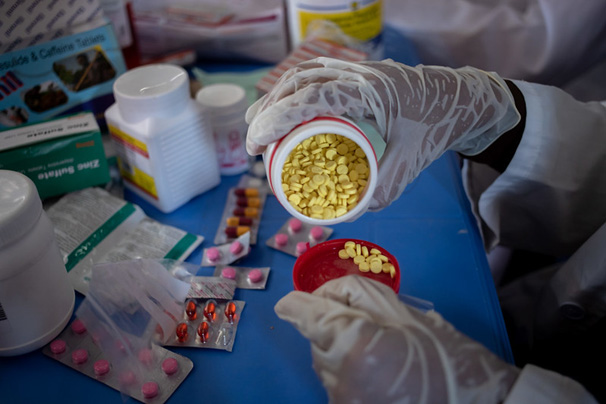 24 March 2024, Mogadishu, Somalia – WHO Somalia, in collaboration with the Federal Ministry of Health and Human Services, marks World Tuberculosis Day 2024 with a renewed commitment to end the tuberculosis (TB) epidemic. Under the theme “Yes! We can end TB!”, WHO aims to inspire hope and promote high-level leadership, increased investments, faster uptake of new WHO recommendations and innovations, and multisectoral collaboration to combat TB.
24 March 2024, Mogadishu, Somalia – WHO Somalia, in collaboration with the Federal Ministry of Health and Human Services, marks World Tuberculosis Day 2024 with a renewed commitment to end the tuberculosis (TB) epidemic. Under the theme “Yes! We can end TB!”, WHO aims to inspire hope and promote high-level leadership, increased investments, faster uptake of new WHO recommendations and innovations, and multisectoral collaboration to combat TB.
“Somalia’s TB programme has weathered recurring climatic shocks, insecurity and the COVID-19 pandemic to show an 87% treatment success rate, 14% decrease in TB incidence, and increase in TB treatment centres from a mere 7 to 109 in the past 2 decades,” said Mr Mohamed Jafar, National TB Programme Manager, Federal Ministry of Health and Human Services. “Even though we are making progress, we still need more support to sustain the gains made over the years, especially in the form of molecular testing machines and outreach activities, as both are critical for case detection.”
TB is a major public health problem in Somalia. Despite the country’s fragility, Somalia’s TB programme has made significant progress since it was re-established in 1995 following its collapse early in the civil war. TB incidence has reduced from 286 cases per 100 000 population in 2010 to 246 cases per 100 000 population in 2023 – a 14% decrease over 14 years.
The number of TB treatment centres in Somalia grew from just 7 centres in 1995 to 109 centres in 2023. TB cases enrolled on treatment have also gradually increased in number, from 10 469 cases per year in 2010 to 18 604 cases per year in 2023. Overall, during this period, the programme enrolled a total of 211 554 TB cases on treatment. The programme successfully saved the lives of 184 052 TB cases from 2010 to 2023 – giving an average treatment success rate of 87%.
WHO Somalia helped the Ministry of Health to establish Somalia’s first treatment centre for drug-resistant TB in 2013 and there are now 11 such centres, which together cover the whole country. Since 2015, a total of 2021 drug-resistant TB cases have been enrolled for treatment. Nearly 1456 of these cases were successfully treated (average treatment success rate of 72%).
Status of TB treatment in Somalia
Management of Somalia’s TB programme is based on WHO’s End TB Strategy, which involves adopting all its diagnostic and treatment regimens. The programme has deployed 100 molecular testing machines, 10 of which are coloured modules for rapid diagnosis of tuberculosis, including cases resistant to second-line TB drugs.
Introduction of this module is proving to be a game-changer in the diagnosis of drug-resistant TB in Somalia. Multidrug resistance can now be diagnosed in the country’s peripheral TB centres instead of solely at its TB culture laboratories. It has three TB culture laboratories capable of diagnosing TB drug resistance to second line TB drugs.
The TB programme is slowly but surely integrating into the country’s emerging primary health care system and private sector. Currently, nearly 50% of the TB centres are fully integrated with primary health care. Also, 7 private hospitals are implementing National TB programme policies to manage TB cases, including reporting quarterly to the TB programme.
Referral mechanisms are also in place to connect other private health providers to the National TB programme. In addition, community involvement in the programme is a key priority, not least because community health workers play an active role in identification and referral of potential TB cases. They also promote treatment adherence and advocacy in the community.
Dr Sindani Ireneaus Sebit, WHO’s focal person for Somalia’s TB programme, said: “As a major partner to the National TB programme, WHO continues to provide essential technical assistance to the Ministry of Health and plays a vital role in TB drug management to ensure that TB drugs are available to patients at their convenience, with no chance of stock-outs.” He added: “As we celebrate World TB Day, let us remember that with the effective coordination created in country among various partners and by exploring further resources, ‘Yes! We can end TB!’ in Somalia.”
For more information, please contact:
Fouzia Bano, Communications Officer, WHO Somalia
Email:
Saeed Ahmed, Reporting/External Relations Officer, WHO Somalia
Email:
ECHO funds help provide lifesaving health supplies and services to over 5 million population across drought-affected states in Somalia
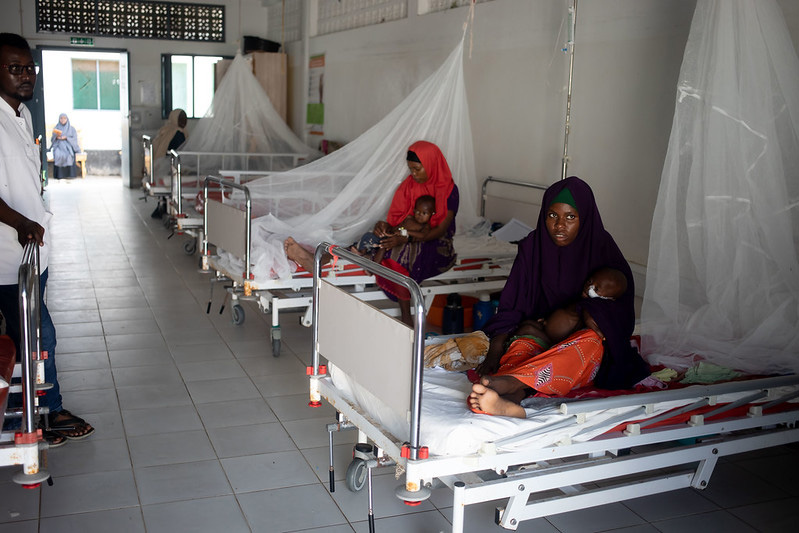 ECHO-funded project helped equip 11 nutrition stablisation centres across target districts with severe acute malnutrition kits to record a cumulative average cure rate of 94.25% amongst under five children. Photo Credit: WHOSom/I. Taxta18 March, 2024 - Mogadishu, Somalia - The United Nations Population Fund (UNFPA) and the World Health Organization (WHO), with funding from the European Civil Protection and Humanitarian Aid Operations (EU ECHO), have supported the Federal and State Ministries of Health to provide lifesaving health supplies and services to over 5 million people across drought-affected areas of Banadir, South West, Jubbaland and Galmudug states in Somalia.
ECHO-funded project helped equip 11 nutrition stablisation centres across target districts with severe acute malnutrition kits to record a cumulative average cure rate of 94.25% amongst under five children. Photo Credit: WHOSom/I. Taxta18 March, 2024 - Mogadishu, Somalia - The United Nations Population Fund (UNFPA) and the World Health Organization (WHO), with funding from the European Civil Protection and Humanitarian Aid Operations (EU ECHO), have supported the Federal and State Ministries of Health to provide lifesaving health supplies and services to over 5 million people across drought-affected areas of Banadir, South West, Jubbaland and Galmudug states in Somalia.
The 24-month ECHO-funded project is to increase access to life-saving health and nutrition services for populations within IDP camps and host communities and addressing the needs of pregnant and lactating women, elderly individuals, and children under five in drought and conflict-affected areas.
Both the WHO and UNFPA supported federal and state ministries of health, and partner organizations to provide life-saving preventative and care services through the procurement and distribution of essential medical supply for effective case management of severe acute malnutrition with medical complications in children, essential health and severe malnutrition kits (including reproductive health kits), as well as to support the timely detection and response to outbreaks. The beneficiaries of these health interventions included over 50% of women and over 1.2 million under-five years of age children in the drought-affected communities.
Simultaneously, the WHO and UNFPA partnership helped mitigate the impact of flash flooding resulting from El-Nino impact in Jubbaland and surrounding states by providing healthcare services to internally displaced populations towards the last quarters of 2023.
Mr. Niyi Ojuolape, UNFPA Somalia Country Representative, commented, 'We are committed to mitigating the impact of drought and conflict on vulnerable populations, particularly pregnant women and young children.'
Dr Renee Van de Weerdt, WHO Representative to Somalia, while appreciating the collaboration between WHO, UNICEF, UNFPA and the Ministry of Health said, 'The drought and food insecurity have severely impacted people health and the Somalian health system. WHO is committed to support the government of Somalia to make the health system more resilient and adapted to climate-related events .'
With support from ECHO, UNFPA, UNICEF and WHO and its health cluster partners will continue to support the government of Somalia with the procurement and distribution of medical supplies to manage severe acute malnutrition, provide emergency obstetric and neonatal care and other reproductive health services, and better detect and respond to outbreaks until April 2025.
For media inquiries, please contact:
UNFPA, Somalia: Fatimah Shah, Communications & Advocacy Specialist,
WHO, Somalia: Fouzia Bano, Communications Officer,
*Note to Editors:
ECHO is the Humanitarian Aid department of the European Commission that provides emergency assistance and relief to the victims of natural disasters or armed conflict outside the European Union.
UNFPA is the United Nations’ (UN) agency that promotes reproductive health, gender equality, and population development to improve the well-being of individuals and communities worldwide.
WHO is the UN’s specialized agency of the United Nations responsible for international public health and leading the health cluster in Somalia.
This project builds on ECHO’s previous support to WHO’s drought response entitled “Support to essential life-saving primary healthcare services and epidemic detection and response through the procurement and distribution of essential medical equipment, supplies and medicines to drought-affected districts in Somalia”.
Further information is available at
[1] https://www.emro.who.int/somalia/priority-areas/drought-response.html


